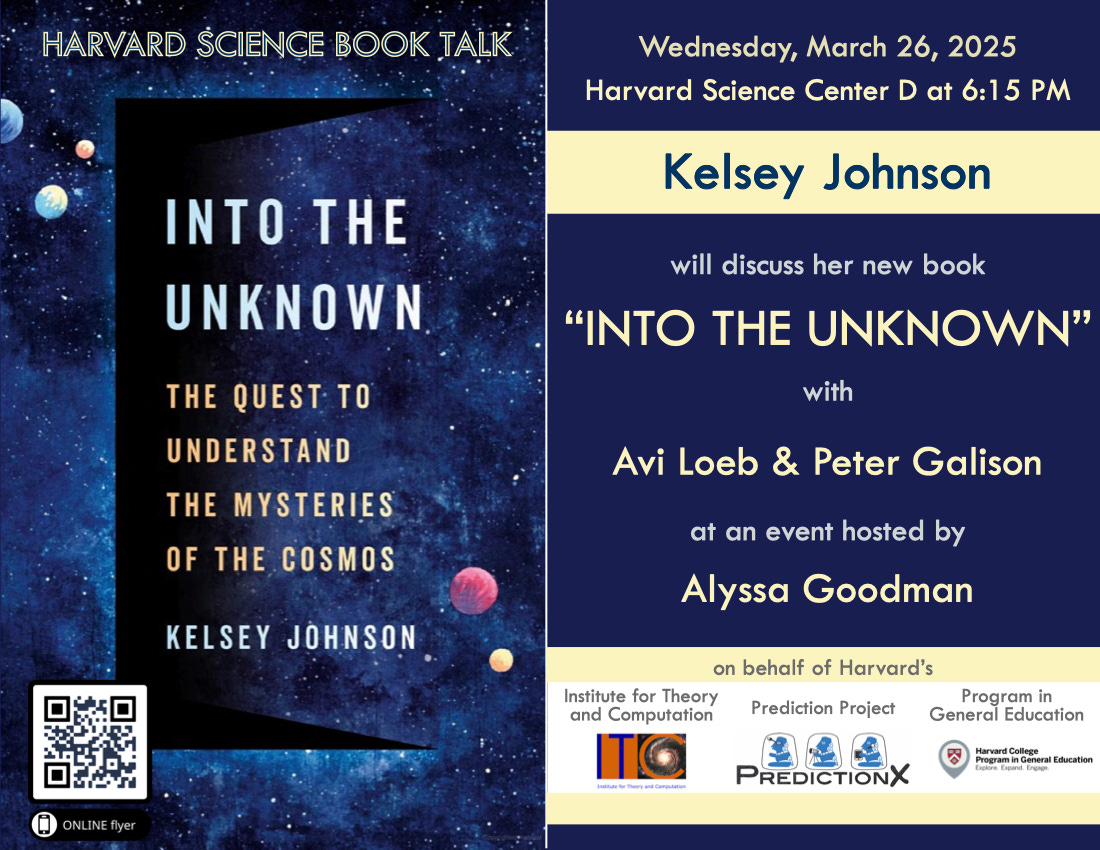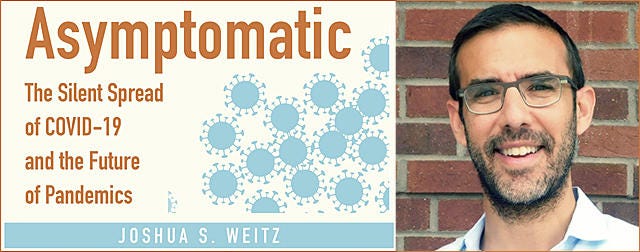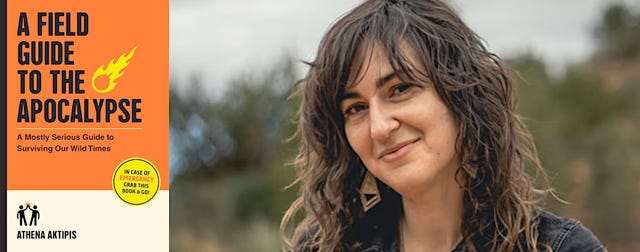Coming this Month
Harvard Science Book Talks welcomes the latest three speakers in our series—Joshua Weitz, Kelsey Johnson, and Athena Aktipis.
Join us as Weitz unpacks the ways in which COVID-19’s devastation proliferated, Johnson delves into the unknowns of the cosmos, and Aktipis guides us through surviving the chaos that is the 21st century.
Joshua S. Weitz, in conversation with Bill Hanage, Asymptomatic: The Silent Spread of COVID-19 and the Future of Pandemics
Date: Tuesday, March 11, 2025, 6pm
Why was COVID-19 so difficult to contain and so devastating to people and economies worldwide? In Asymptomatic, author Joshua S. Weitz explains how silent transmission enabled COVID-19's massive and tragic global impact.
Weaving the science of viral infections together with an insider's look at response efforts, Weitz guides readers through the shockwaves of successive epidemic waves as public health officials and academic research teams confronted the rise and risk of what was then a burgeoning global pandemic. The discovery of asymptomatic spread also fueled competing narratives: either COVID-19 was about to dissipate as quickly as it had emerged or completely disrupt life as we knew it.
Weitz, a physicist-turned-biologist who directs a quantitative viral dynamics research group and has been immersed in COVID-19 response efforts, explains both why and how scientists tried to wade through competing narratives and warn the public of COVID-19's profound risk. As explored through a careful analysis of local outbreaks, accessible descriptions of virus dynamics, and the use of predictive models to guide response efforts, Asymptomatic provides readers a unique look into the secret ingredient that allowed COVID-19 to spread across borders and the high-impact interventions needed to fight it and future pandemics.
Joshua S. Weitz is a Professor of Biology at the University of Maryland, College Park where he holds the Clark Leadership Chair in Data Analytics and is a Faculty member of the Institute for Health Computing. Previously, he held the Tom and Marie Patton Chair at Georgia Tech where he founded the Graduate Program in Quantitative Biosciences. Weitz received his PhD in Physics from MIT in 2003 and did postdoctoral training in ecology and evolutionary biology at Princeton from 2003-2006. Weitz directs an interdisciplinary group focusing on understanding how viruses transform human and environmental health. Weitz is the author of multiple textbooks on quantitative modeling of living systems and is a Fellow of the American Association for the Advancement of Science, a Fellow of the American Academy of Microbiology, and a Simons Foundation Investigator in the Theoretical Physics of Living Systems.
Bill Hanage is a Professor of Epidemiology and Associate-Director of the Center for Communicable Disease Dynamics at Harvard T. H. Chan School of Public Health. His research and teaching focus on the epidemiology of infectious disease and the evolution of infectious agents. He received his PhD from Imperial College London. Dr Hanage’s work has studied many different microbes, both bacteria and viruses, and he is especially interested in how infectious threats evolve in response to interventions such as vaccination or antimicrobials. His awards include the Fleming Prize from the Microbiology Society and a young investigator award from the American Society for Microbiology. He has published more than 200 scientific articles and book chapters and is a regular contributor to popular media aiming to improve public understanding of the SARS-CoV-2 pandemic and other infectious diseases
Kelsey Johnson, in conversation with Avi Loeb & Peter Galison, Into The Unknown: The Quest To Understand The Mysteries Of The Cosmos

Date: Wednesday, March 26, 2025, 6:15pm
Humans have learned a lot about the world around us and the universe beyond. We have made powerful insights and created profound theories about the universe and everything in it. Surely the ultimate theory must be waiting, just beyond our current knowledge.
Well, maybe. In Into the Unknown, astrophysicist Kelsey Johnson takes us to the edge of scientific understanding about the universe: What caused the Big Bang? What happens inside black holes? Are there other dimensions? She doesn’t just celebrate what we know but rather what we don’t, and asks what it means if we never find that knowledge. Exploring the convergence of science, philosophy, and theology, Johnson argues we must reckon with possibilities—including those that may be beyond human comprehension. The very places where we run smack into total ignorance are the places where the most important questions—about the philosophy of knowledge, the nature of our cosmos, and even the existence of God—await.
As accessible as it is profound, Into the Unknown invites each of us to join in the great quest for knowledge.
Kelsey Johnson is a professor of astronomy at the University of Virginia, former president of the American Astronomical Society, and founder of the award-winning Dark Skies, Bright Kids program. She has won numerous awards for her research, teaching, and promotion of science literacy. She lives in rural Virginia with her family, including two very large dogs.
Athena Aktipis, A Field Guide to the Apocalypse: A Mostly Serious Guide to Surviving our Wild Times
Date: Thursday, March 27, 2025, 6pm
Is this finally it? The end times? Because from COVID-19 to climate catastrophe to the looming AI revolution—not to mention the ever-growing background hum of rage, fear, and anxiety—it’s starting to feel like the party we call civilization is just about over. The good news? It’s always felt that way.
Drawing on evolutionary psychology, history, brain science, game theory, and more, cooperation theorist (and, coincidentally, zombie expert) Athena Aktipis reassuringly explains how we, as a species, are hardwired to survive big existential crises. And how we can do so again by leveraging our innate abilities to communicate and cooperate.
Pack a ukulele in your prep kit. Practice your risk-management skills. Enlist your crew into a survival team. And embrace the apocalypse. You might just enjoy it. Plus, it will help us build a better and more resilient future for all humankind.
Athena Aktipis is an Associate Professor in the Department of Psychology at Arizona State University. She is a cooperation theorist, evolutionary biologist, and cancer biologist who researches cooperation in humans, particularly in times of need, as well as other systems that are governed by fundamental tensions between cooperation and conflict. She is co-Director of The Human Generosity Project and The Cooperation Science Network. Aktipis is the President and co-Founder of the International Society for Evolution Ecology and Cancer and also the founder and President of Zombified Media. Aktipis is an avid science communicator, hosting the science podcast, Zombified, and producing events across the country and internationally at Universities, community spaces, and music festivals. Aktipis is passionate about building interdisciplinary teams to tackle tough questions, empowering students to learn about the topics they are most curious about, and leveraging cooperation theory to improve our universities and the broader communities in which we are all embedded. She is the author of The Cheating Cell: How evolution helps us understand and treat cancer (Princeton University Press, 2020), and is currently on tour for her second book, A Field Guide to the Apocalypse: A mostly serious guide to surviving our wild times (Workman, 2024). Aktipis also writes for Scientific American, Slate, Aeon, and other magazines.







I have a thought experiment for my data friend's out there.
Option 1: A solar-powered laptop with all of Wikipedia saved on it.
Option 2: The same laptop, but with a local AI model instead.
It's an apocalypse. Global Internet is gone.
Which do you pick?
The interview with Steven Levitsky in Der Spiegel magazine, also translated into English is rather instructive.